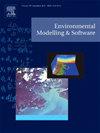地面臭氧的网络分析:对环境政策和空气质量管理的影响
IF 4.8
2区 环境科学与生态学
Q1 COMPUTER SCIENCE, INTERDISCIPLINARY APPLICATIONS
引用次数: 0
摘要
随着网络科学在“大科学”时代成为一种变革性工具,本研究利用这一工具来模拟1980年至2017年不同监管框架下美国各州的地面臭氧分布动态。这些法规的演变提供了一个独特的自然实验来分析网络驱动模型如何在不同的环境政策中演变。通过构建基于Pearson相关系数连接的臭氧监测点网络,分析了空气质量网络的结构演变。社区检测等技术突出了受气象和能源消耗数据影响的臭氧水平的局部和时间变化。我们的研究结果表明,地理和监管因素显著地塑造了网络结构。本研究展示了网络科学如何阐明环境系统中复杂的相互依赖关系,并建议整合这些见解可以完善空气质量法规,促进更有效的管理策略,以符合先进的环境建模需求。本文章由计算机程序翻译,如有差异,请以英文原文为准。
Network analysis of ground-level ozone: Implications for environmental policy and air quality management
As network science emerges as a transformative tool in the ‘Big Science’ era, this study harnesses this tool to model ground-level ozone distribution dynamics across US states under different regulatory frameworks from 1980 to 2017. The evolution of these regulations provides a unique natural experiment to analyze how network-driven models evolve amidst varied environmental policies. By constructing a network from ozone monitoring sites connected based on Pearson correlation coefficients, we analyzed the structural evolution of air quality networks. Techniques like community detection highlighted localized and temporal variations in ozone levels, influenced by meteorological and energy consumption data. Our findings reveal that geographical and regulatory factors significantly shape the network structure. This research demonstrates how network science can elucidate the complex interdependencies in environmental systems and suggests that integrating these insights could refine air quality regulations, promoting more effective management strategies in line with advanced environmental modeling needs.
求助全文
通过发布文献求助,成功后即可免费获取论文全文。
去求助
来源期刊

Environmental Modelling & Software
工程技术-工程:环境
CiteScore
9.30
自引率
8.20%
发文量
241
审稿时长
60 days
期刊介绍:
Environmental Modelling & Software publishes contributions, in the form of research articles, reviews and short communications, on recent advances in environmental modelling and/or software. The aim is to improve our capacity to represent, understand, predict or manage the behaviour of environmental systems at all practical scales, and to communicate those improvements to a wide scientific and professional audience.
 求助内容:
求助内容: 应助结果提醒方式:
应助结果提醒方式:


